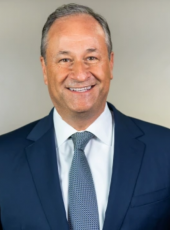
Remarks by the Second Gentleman at the White House and National Endowment for the Arts' "Healing, Bridging, Thriving, A Summit on Arts and Culture in our Communities"
[As Prepared for Delivery]
SECOND GENTLEMAN DOUGLAS EMHOFF: Thank you, Chair Jackson, for your leadership. It's great to be here at today's summit to discuss arts and culture in our communities.
I would also like to recognize the White House Domestic Policy Council, and my good friend, Neera Tanden, for co-hosting today's summit.
As a former entertainment lawyer in Los Angeles, I built my career around the arts.
I've seen firsthand how art, film, and music can help build and foster community.
I loved every minute of working in the entertainment industry, and I've stayed connected to the profession by teaching entertainment law at Georgetown.
An appreciation of the arts is also something the Vice President and I have in common.
Her interest in the arts began at a young age, when she attended a fine arts school as a child. And the understanding of art she gained there propelled her to serve as a trustee on the board of the San Francisco Museum of Modern Art.
We both understand how art can bring people together and help form common bonds.
When we had the opportunity to select art and décor for the Vice President's residence, we were intentional and thoughtful about our selections.
We chose works that tell stories, reflect the diversity of our nation, and compel people to think.
And over the past few years, the Vice President and I have welcomed artists, musicians, writers, and dancers to our home.
Through our efforts, the Vice President's Residence has truly become a public space where we bring people together to promote and enjoy the arts.
As Second Gentleman, much of my work has focused on countering hate and building coalitions.
Over the past three years, I've traveled the country and the world speaking out about the need to combat Antisemitism, Islamophobia, and all forms of hate.
We know this hate is interconnected. It impacts all of us. That's why we must bring people together from all backgrounds, faiths, and ethnicities to fight back.
As part of that work, I've talked about the important role of the arts and interfaith cooperation in combating hate, including at the John F. Kennedy Library in Boston and right here in D.C. at the National Gallery, alongside Chair Jackson.
I've held interfaith discussions with students at our home and with faith leaders in different countries to build relationships, break down stereotypes, and reduce prejudices.
The arts have a unique ability to unite us. They help us build empathy, strengthen mutual understanding, and inspire change.
That's why, at a time like this, we need to use the arts and humanities to help us counteract ideological extremes and build human connections.
And we must protect of freedom of expression and our ability to create art at all costs.
Museums, monuments, and places of worship can all play a role in educating people on the horrors of the past and ensuring history does not repeat itself.
From our common traditions, to our common history, to our common values, there is more that unites us than divides us.
As you heard earlier today, our agency partners are working to advance three new initiatives from the Biden-Harris Administration that will uplift the arts across different sectors.
Under the leadership of Secretary Becerra and Chair Jackson, we are standing up an Interagency Working Group on Arts, Health, and Civic Infrastructure.
This working group will help federal agencies coordinate on research and identify more meaningful opportunities for arts partnerships.
The Environmental Protection Agency's Office of Water is also launching its first-ever artist-in-residence program, which will connect artists with local communities to elevate their stories and in turn build and foster community.
And the National Endowment for the Arts and National Endowment for the Humanities have announced a $5 million commitment to the United We Stand initiative, which supports projects that combat hate and promote cross-cultural understanding.
These new initiatives underscore how deeply the Biden-Harris Administration values the arts and understands the important role they play in a healthy and thriving society.
Each project will help support our communities and strengthen our democracy.
On behalf of the President, Vice President, and First Lady, I would like to thank our agency partners who have continued to champion this important work.
You're making a real difference in people's lives, and we could not do this without you.
And now, I'd like to introduce spoken word artist, writer and librettist, and Vice President of Social Impact at the Kennedy Center, Marc Bamuthi Joseph.
Doug Emhoff, Remarks by the Second Gentleman at the White House and National Endowment for the Arts' "Healing, Bridging, Thriving, A Summit on Arts and Culture in our Communities" Online by Gerhard Peters and John T. Woolley, The American Presidency Project https://www.presidency.ucsb.edu/node/369623

